Real Estate App Development Cost: Key Factors & Insights
Ashok Sachdev
March 13, 2025 166 Views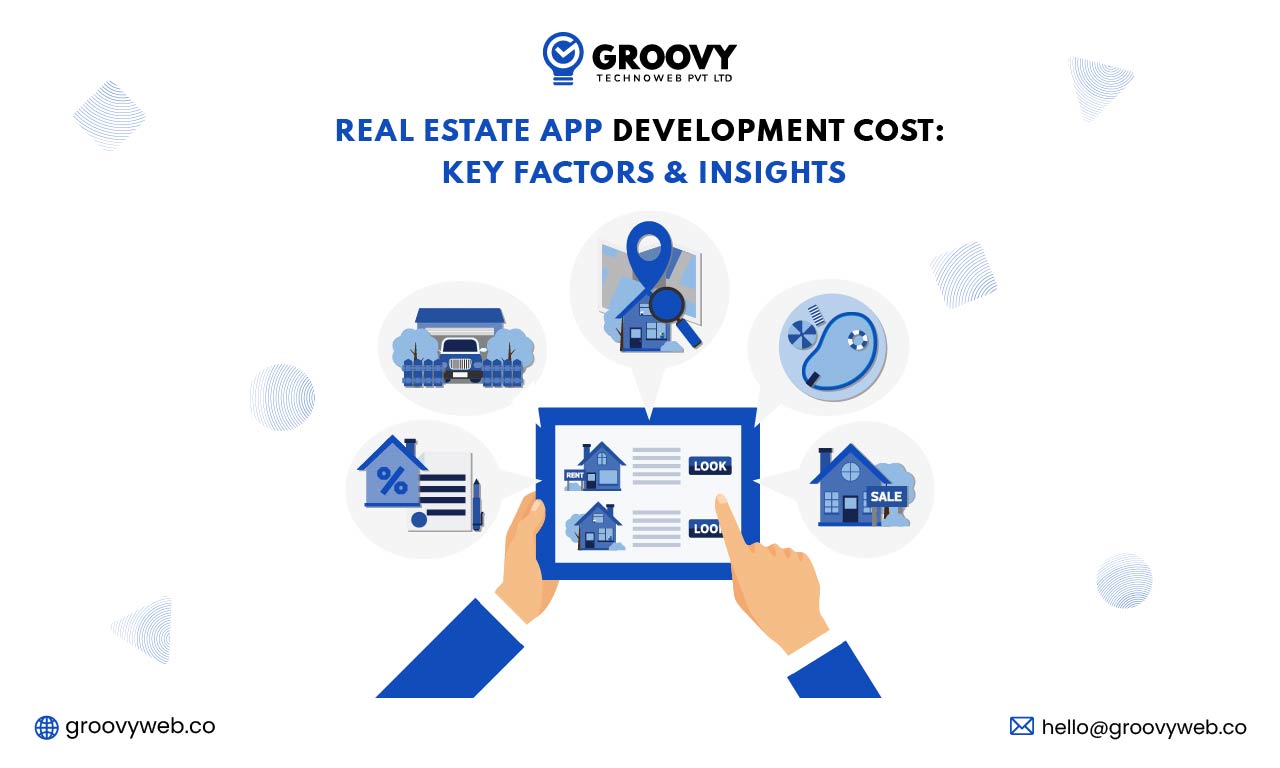
Quick Summary : The cost of real estate app development varies based on features, complexity, and platform selection, with prices ranging from $20,000 to $250,000+. To optimize budgets, businesses should start with an MVP, choose cross-platform development, and integrate third-party APIs. Trends like AI, blockchain, and AR/VR enhance user experience but may increase costs. Groovy Web offers tailored real estate app solutions to meet your business needs efficiently.
The real estate sector is transforming with digitalization, and mobile apps are at the forefront of this transformation. However, Statista’s App Market Forecast more widely indicates that the general app market is to have a CAGR of 7.48% during the period of 2022 to 2029 and that by 2029, its estimated market volume will be US$781.70 billion.
As per the National Association of REALTORS® “Real Estate in a Digital Age” report, 97% of home buyers utilized the internet in their house search, and 76% used a mobile or tablet search device. But how much does it cost to develop an app? The cost depends on several factors, such as features, platform, development strategy, and third-party integrations.
In this article, we will discuss the most important factors that determine real estate app development costs, an expense breakdown by app complexity, best practices to save on development costs, and the latest trends that are going to shape the future of real estate applications.
Understanding Real Estate App Development Cost
The real estate sector is experiencing a significant digital transformation, with mobile applications being the key to property purchase, sale, and management. Whether you are a real estate company, a startup, or an investor, it is important to know the cost of creating a real estate app before embarking on your project.
A real estate app goes beyond property listings; it requires seamless UX, advanced search, secure transactions, and AI-driven recommendations to stay competitive. Development costs vary based on app type, features, platform, and location, making strategic planning essential for a scalable, future-ready solution.
While investing in a real estate app is essential, selecting the right software development services plays a crucial role in its success. A well-built app must ensure scalability, security, and high performance while integrating AI, virtual tours, and blockchain transactions. Partnering with an experienced real estate software development company ensures a cost-effective, feature-rich app built for long-term success.
Real Estate App Market Trends & Growth Potential
The real estate mobile app market has witnessed tremendous growth in recent years, driven by innovation in AI, blockchain, and AR/VR technologies. Here are some insights into the industry:
The real estate software market is poised to cross $15.8 billion by 2028, powered by growing digitalization. Virtual tours boost property interaction by 300%, which means 3D walkthroughs and AR-driven features are an absolute necessity for real estate apps. Mobile-first property platforms experience 2x greater conversion rates than the standard web-based searches, and this highlights the importance of optimizing mobile apps.
With these figures in mind, it’s evident that investing in a real estate app is a strategic decision for long-term success.
General Cost Estimates for a Real Estate App
The cost to build a real estate app varies with its complexity, features, and target audience. The estimated cost breakdown by development complexity is given below:
| App Complexity | Estimated Cost (approx.) | Development Time |
| Basic MVP App | $20,000 – 50,000 | 3-6 Months |
| Mid-Level App (Advanced Features) | $50,000 – $100,000 | 6-9 Months |
| Enterprise-Level Custom App | $100,000 – $250,000+ | 9-12 Months |
Key Factors Influencing Real Estate App Development Cost
There are a number of important factors that influence the price of real estate app development, ranging from the nature of the app to the platform, design, and integrations. Let’s discuss them in detail.
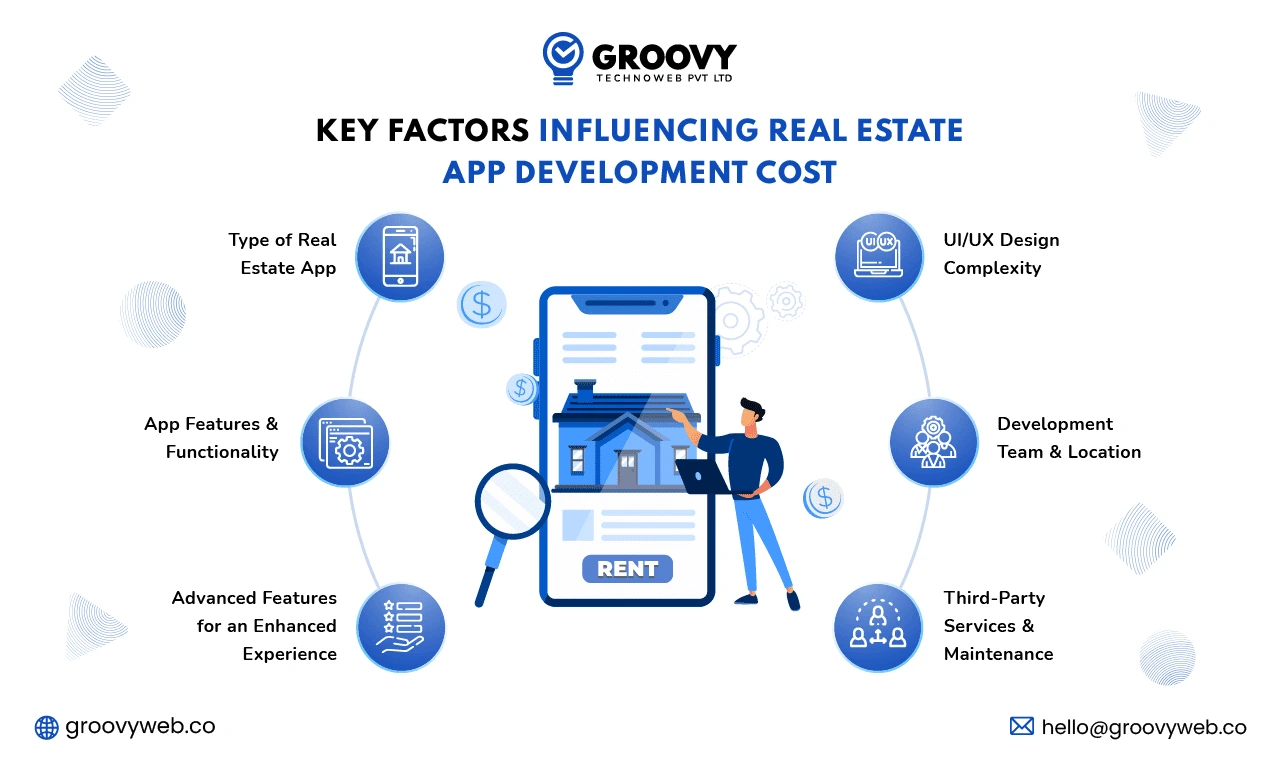
1. Type of Real Estate App
The nature of the real estate app you opt for has a significant influence on development expenses. There are apps that specialize in property listings, while others are designed for property management, agent CRM, or vacation rentals.
- Real estate listing apps enable users to view, list, and filter listings effectively.
- Marketplace apps enable purchasing, selling, and renting of properties with sophisticated filters and payment integration.
- CRM applications assist real estate agents in handling client contacts, leads, and sales tracking.
- Property management apps help landlords deal with maintenance, rent collection, and tenant management.
2. App Features & Functionality
The capabilities built into the app are the key to its usability and functionality. Although the core functions enable fundamental real estate transactions, richer features enable participation and personalization.
Essential Features for a Basic MVP App
A Minimum Viable Product (MVP) is developed with essential features that enable users to search for properties and communicate with sellers or agents.
- User Registration & Profile Management
- Property Listings with Images & Descriptions
- Search & Filtering Options
- Google Maps Integration
- Favorites & Wishlist
- Push Notifications
These basic features provide a user-friendly experience, facilitating smooth property exploration and communication among buyers, sellers, and agents.
3. Advanced Features for an Enhanced Experience
To remain competitive, real estate apps incorporate the latest technology that enhances user engagement and decision-making. Some of the advanced features are:
- AI-Driven Property Suggestions for a tailored search experience
- Augmented Reality (AR) & 3D Virtual Tours for engaging property exploration
- Blockchain-Based Secure Transactions to provide transparency and security
- Mortgage Calculator & Loan Guidance for financial planning
- Chatbots & Virtual Assistants to respond to user queries in real-time
4. UI/UX Design Complexity
A simple yet visually attractive design increases user interaction and keeps visitors on the app. The UI/UX of a real estate app must emphasize:
- Easy Navigation & Simple Search Filters
- Good Quality Property Photos & Videos
- Smooth Property Comparisons
- Responsive & Interactive Design
Apps with simple designs are simpler to use, whereas apps with custom animations and transitions offer a more interactive feel.
5. Development Team & Location
Where the development team is based also determines the overall strategy for developing the app. Regions vary in terms of levels of expertise and development processes and thus affect the overall duration and execution of the project.
| Region | Development Approach |
| North America & Western Europe | High-end, complex app development with a focus on premium design and scalablity |
| Eastern Europe | Balance of cost-effectiveness and quality development, ideal for startups and mid-sized businesses |
| Asia(India, Southeast Asia) | Affordable and scalable development, widely preferred for outsocurcing mobile app projects. |
6. Third-Party Services & Maintenance
For seamless operation and long-term success, real estate apps need to be integrated with third-party services and regularly maintained.
- Cloud Hosting (AWS, Google Cloud, Azure) offers elastic storage and quick data access.
- Security Compliance (GDPR, CCPA) protects data and complies with regulations.
- Bug Fixes & Regular Updates ensure the app is kept optimized and performance issues-free.
Cost Breakdown Based on App Complexity
Creating a real estate app encompasses several aspects, ranging from simple property listings to AI-driven suggestions and virtual property tours. The app’s complexity plays a major role in determining development time, resources needed, and third-party integrations. To make it easier for businesses to comprehend the investment required, let’s categorize the cost by app complexity and feature set.
Comprehending App Complexity & How It Affects Development
A real estate app may vary from a simple MVP to a completely personalized enterprise solution. The following are the three major categories:
- MVP Development (Minimum Viable Product) – Provides only the basic features for initial testing.
- Mid-Level App (Sophisticated Features) – Adds advanced features to provide a great user experience.
- Enterprise-Level Custom App – A high-end platform with AI, blockchain, and AR/VR integrations.
Breakdown of Features Based on Complexity
| App Complexity | Core Features | Advanced Features |
| Basic MVP App | User registration, property listing, search filters, contact agent, Google Maps integration, push notifications | Limited property images, email alters, favorites &wishlist |
| Mid-Level App | Enhanced property listings with videos, mortgage calculator, chatbot for inquiries, CRM integration, advanced search filters | AI-driven recommendation, virtual property tours, in-app messaging |
| Enterprise Level App | Custom property marketplace, blockchain transactions, 3D & AR property tours, IoT-based smart home integration | Machine learning property valuation, voice search, personalized user dashboards |
Real Estate App Development Insights
- According to a survey, 58% of real estate firms have already adopted some type of AI, while another 27% intend to adopt it in the next 1-2 years.
- Listed properties with a virtual tour experience a 130% rise in inquiries since the interactive and immersive experience attracts prospective buyers.
- Although a particular figure stating that 85% of homeowners expect real estate apps to include an interactive map for better location-based filtering was not available, the significance of interactive maps in providing a better user experience in real estate apps is well established.
Ways to Reduce Real Estate App Development Cost
Developing a high-quality real estate app involves intelligent cost control without sacrificing performance and user experience. Through strategic development planning, companies can cut costs without compromising on quality.
Start with an MVP & Scale Gradually
A Minimum Viable Product (MVP) enables companies to pilot the market prior to making an investment in sophisticated features.
Advantages of an MVP Strategy:
- Quicker time to market – Release fast and collect user feedback.
- Reduced upfront investment – Prioritize core functions first.
- Scalability – Insert sophisticated features based on increasing demand from users.
Opt for Cross-Platform Development Instead of Native
Creating a real estate app involves deciding between native app development (different apps for iOS and Android) or cross-platform development (single codebase for both). Native apps are more performant but expensive and time-consuming, as they involve different coding and maintenance.
Cross-platform technologies such as Flutter and React Native enable companies to develop a single app that is compatible with both iOS and Android, cutting down on development time and expenses by as much as 50%. These apps provide quicker updates, broader reach, and close-to-native performance, making them a shrewd decision for startups and enterprises alike. Airbnb and Realtor.com leverage cross-platform technology to provide top-notch user experiences while keeping costs in check.
Use Pre-Built APIs Instead of Custom Development
Developing from scratch takes more time and resources. Rather than that, utilizing third-party APIs such as Google Maps for geographic search, MLS API for up-to-date listings of properties, Stripe/PayPal for transactions, and AI chatbots for customer service can make development efficient, save time and money, and improve security.
With APIs, deployment is accelerated, security standards are adhered to, and reliability is established. APIs are utilized by numerous real estate websites, such as Zillow and Redfin, to enhance user experience without extra development time.
Future Trends in Real Estate App Development & Their Cost Impact
The real estate sector is constantly changing, and emerging technologies are influencing how properties are sold, bought, and handled. Companies that adopt emerging trends into their real estate applications can maximize user interaction, simplify transactions, and offer creative solutions for agents, sellers, and buyers. Nevertheless, integrating these developments affects creating costs as well.
With more advanced technology, companies need to weigh both the advantages and the costs of such innovations. The following are some of the most important real estate app trends and how they affect costs.
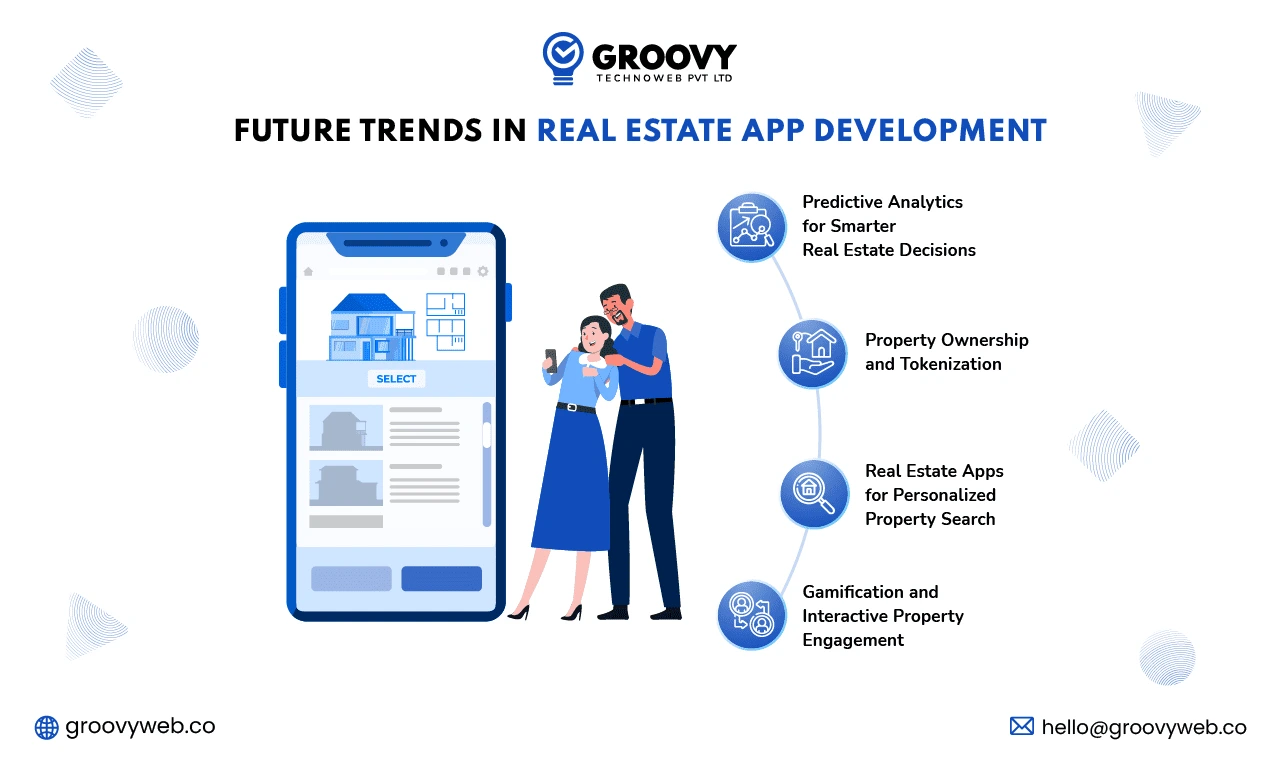
1 Predictive Analytics for Smarter Real Estate Decisions
Predictive analytics is changing the real estate industry by leveraging big data and AI-driven intelligence to monitor market trends, real estate prices, and buyer and seller habits. It helps consumers and investors to make intelligent decisions based on previous information and expected predictions.
Impact on Real Estate Apps
- Predictive analytics supported by AI anticipate property value and rental return, enhancing investors’ and buyers’ decision-making.
- AVMs facilitate speedy and precise valuation of properties, eliminating the need for manual estimations.
- Targeted recommendations supported by predictive analysis enhance user satisfaction and retention.
Cost Impact
The integration of predictive analytics involves sophisticated AI models, data processing, and machine learning algorithms, which contribute to higher development costs. The long-term advantages, however, are improved decision-making and streamlined property transactions, making it a worthwhile investment.
2. Fractional Property Ownership and Tokenization
Real estate tokenization enables the division of property into smaller units and sale as digital tokens on blockchain platforms. It is causing property investment to become more accessible through the ability of investors to own part of a property instead of buying it whole.
Impact on Real Estate Apps
- Reduces investor entry barriers, enabling individuals to invest in real estate.
- Increases the liquidity level in the real estate market, facilitating easy property share sale and purchase.
- Provides security and transparency in transactions using blockchain technology.
Cost Impact
Building a real estate app with tokenization capabilities involves integrating blockchain, smart contract creation, and financial regulatory compliance. These elements raise app development costs initially but offer a value proposition that can appeal to a wider audience.
3 Hyperlocal Real Estate Apps for Personalized Property Search
Hyperlocal real estate applications target individual neighborhoods, communities, and specialty markets. They offer in-depth information on property prices, local amenities, school grades, and crime rates to enable buyers to make well-informed choices.
Impact on Real Estate Apps
- Improves user experience through localized information and personalized property suggestions.
- Connects with geolocation services to offer current market information and local trends.
- Assists real estate companies in targeting specific buyer groups with personalized listings.
Cost Impact
Building a hyperlocal real estate app involves interconnection with a variety of sources of data, geolocation technology, and specific algorithms for proposing properties. These are additional investment requirements but with greater user activation and conversion potential.
4 Gamification and Interactive Property Engagement
Gamification in real estate apps boots user interaction by adding interactive features like property quizzes, virtual property challenges, and incentives for users who actively browse listing.
Impact on Real Estate Apps
- Engages users for longer periods on the app, increasing retention.
- Provides a competitive advantage through the provision of a unique and interactive property search experience.
- Spurs greater social sharing, since users tend to share apps with interactive elements.
Cost Impact
Gamification features are developed with interactive UI elements, real-time monitoring, and reward system integration, which adds to the cost of development. Gamified apps do attract and retain more users, enhancing long-term profitability.
Final Thoughts
Creating a real estate app is a matter of precise cost estimation, with the cost varying between $20,000 for a minimum viable product and $250,000+ for an enterprise-grade app. Costs vary based on features, platform selection, third-party integration, and technologies such as AI, blockchain, and AR/VR.
Companies can maximize budgets by beginning with an MVP, opting for cross-platform mobile app development, and using third-party APIs to minimize custom development. Although high-end features raise the initial investment, they result in improved user engagement and greater ROI in the long term.
Written by: Ashok Sachdev
Ashok Sachdev is the Project Manager at Groovy Web who began his professional career as a programmer at the young age of 17. Ever since then he is actively growing, learning new things, and adapting to new roles and responsibilities at every step. Aside from being an app developer, he is highly admired for his project management skills by his clients.
Frequently Asked Questions
We hope these clear your doubts, but if you still have any questions, then feel free to write us on hello@groovyweb.coWhat factors influence real estate app development costs?
Key considerations are app complexity, features, platform choice (iOS, Android, or both), UI/UX design, third-party API integrations, and developer location.
Can I save on real estate app development costs?
Yes. Beginning with an MVP, using cross-platform development, and incorporating pre-existing APIs can assist in reducing costs without sacrificing functionality.
What are the current trends in real estate app development?
AI-driven recommendations, blockchain for safe transactions, AR/VR property viewings, IoT-based smart home integrations, and hyperlocal search are setting the future tone for real estate apps.
What must a real estate app have in terms of features?
Key features are property listings, search filters, maps integration, in-app messaging, and push notifications. Advanced features such as AI suggestions, AR/VR tours, and blockchain transactions support the user.
Related Blog
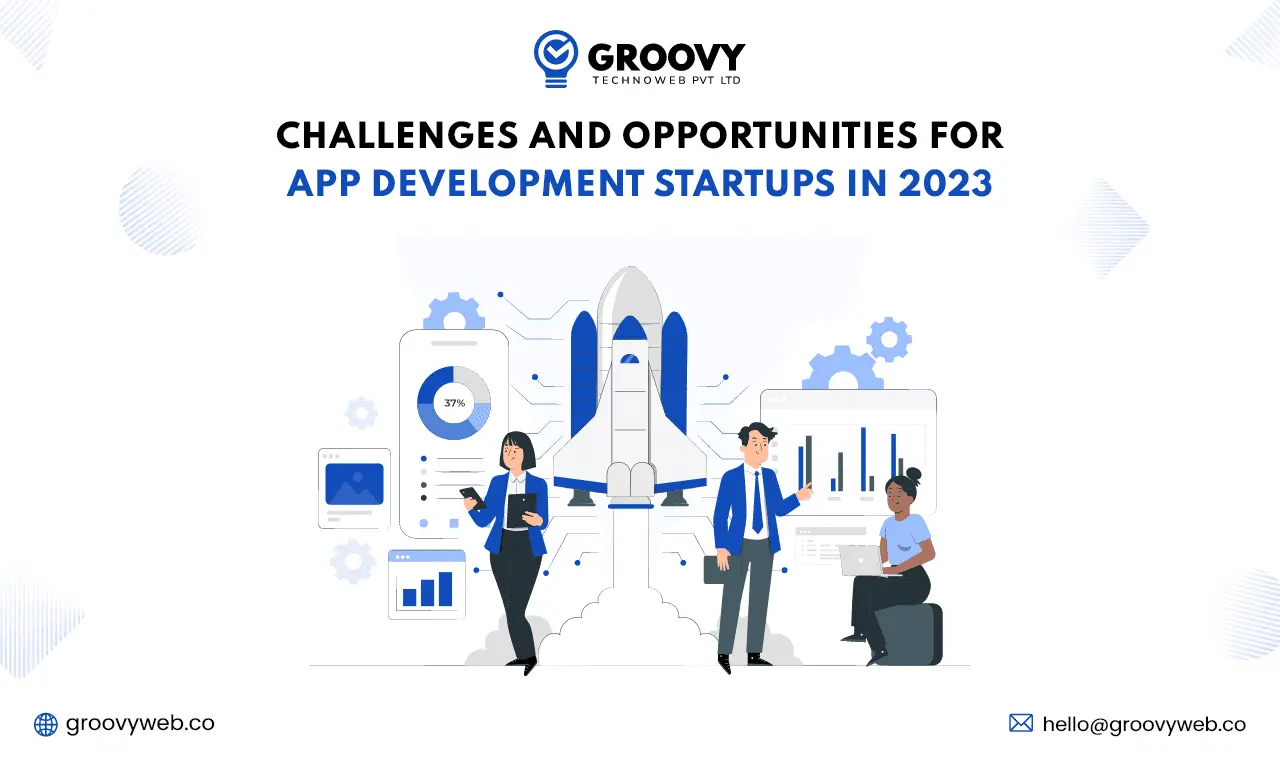
Ashok Sachdev
Challenges and Opportunities for App Development Startups in 2023
Startup 21 Nov 2024 21 min read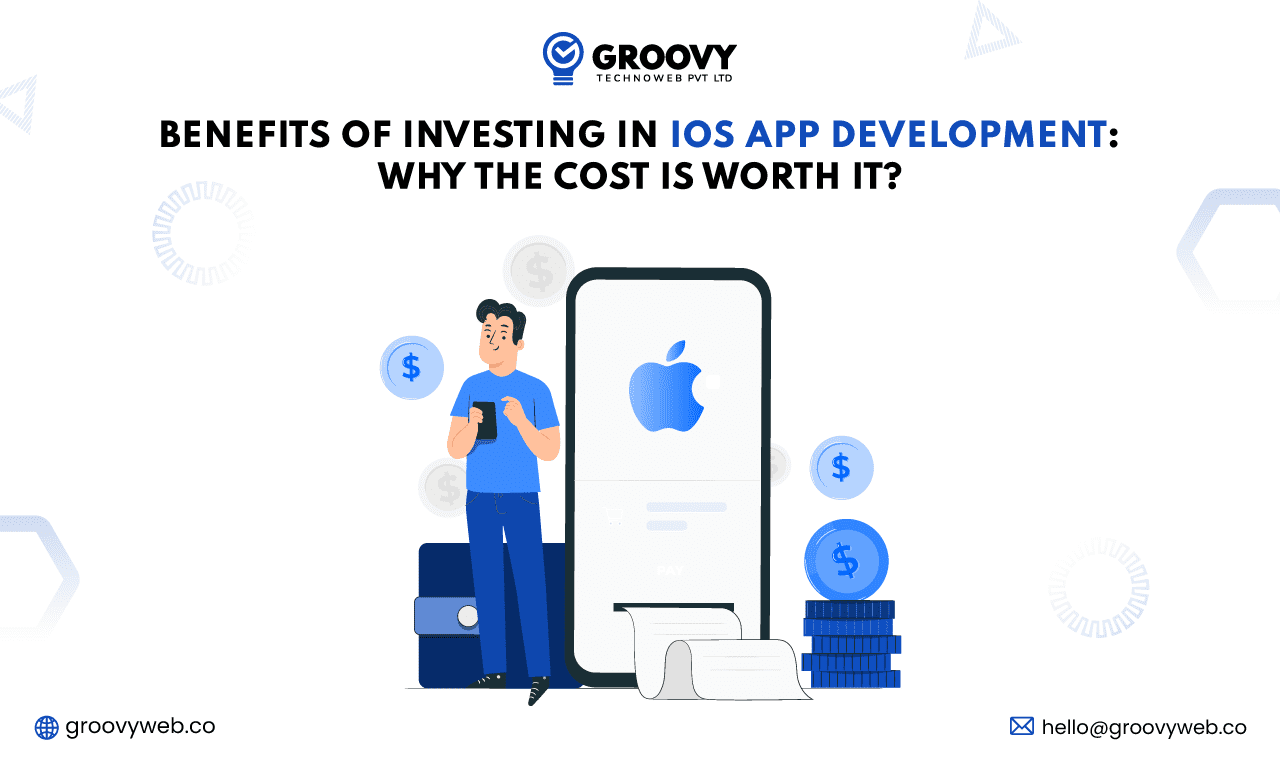
Rahul Motwani
Benefits of Investing in IOS App Development: Why Cost is Worth It?
Mobile App Development 14 Nov 2024 13 min read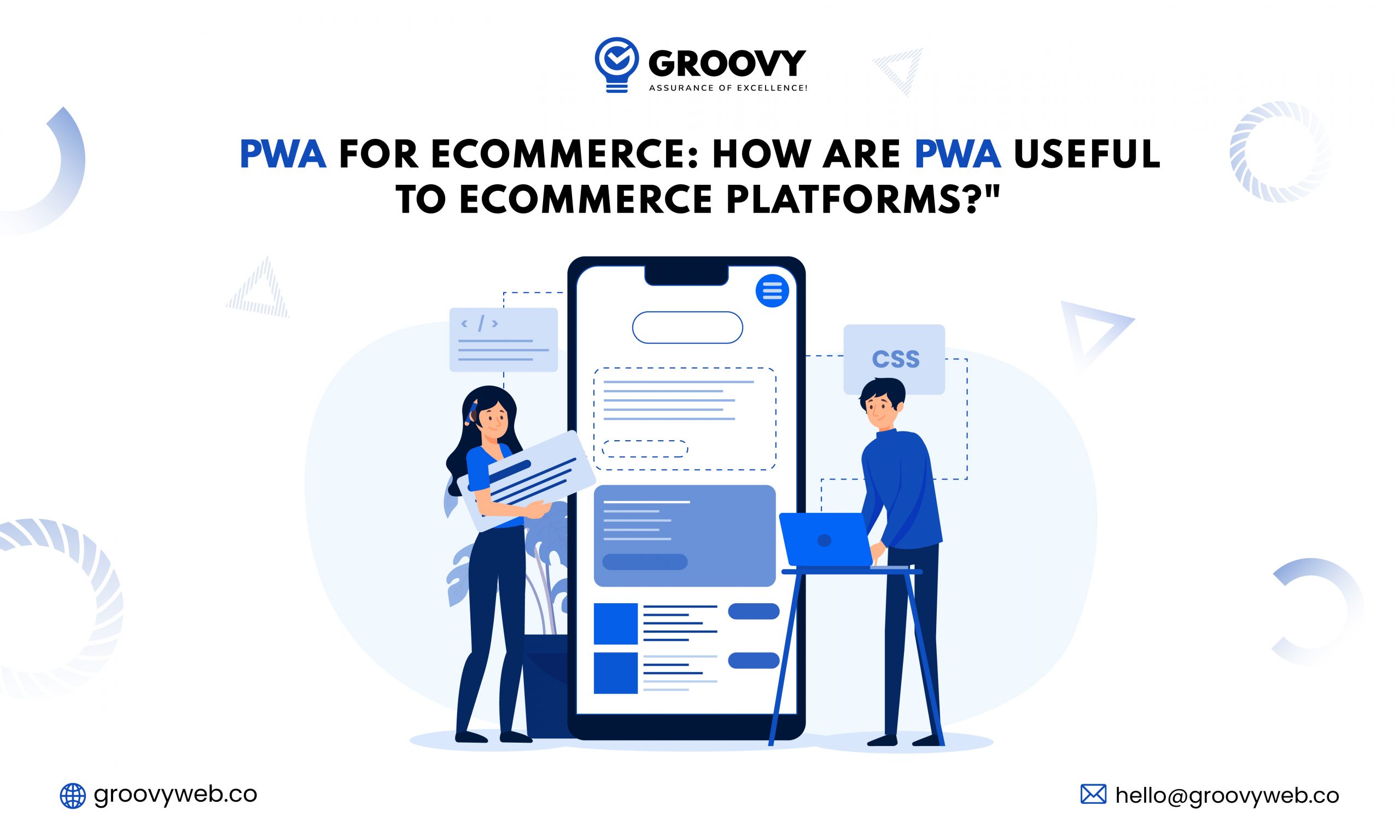
Nauman Pathan
PWA for eCommerce: How are PWA Useful to eCommerce Platforms?
Web App Development 14 Nov 2024 19 min readSign up for the free Newsletter
For exclusive strategies not found on the blog